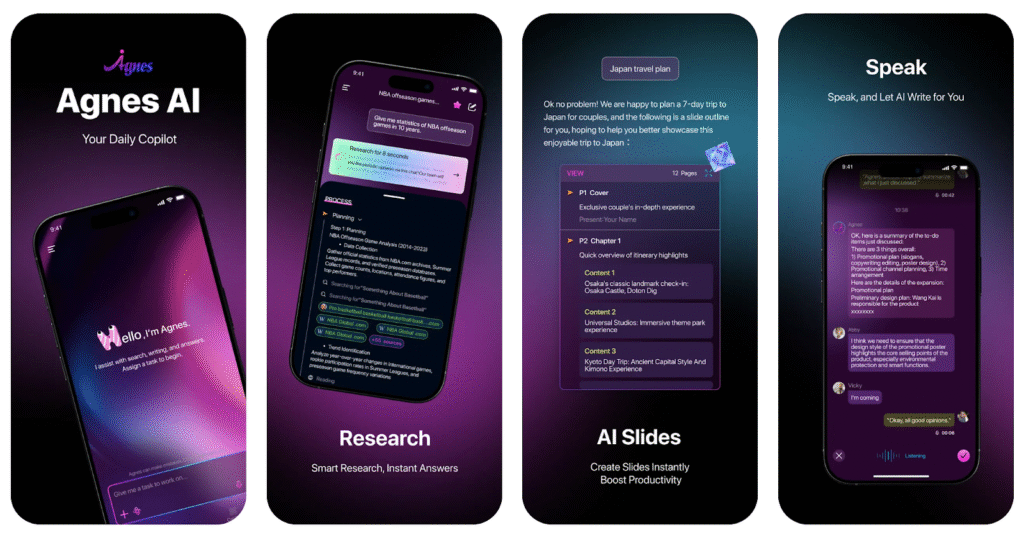Group chat has stagnated. Teams toggle between Slack, WhatsApp, and a dozen productivity apps, losing context with every switch. Agnes AI, a Singapore-based conversational agent, reached 150,000 daily active users since its launch in July, and its rapid ascent signals something different is taking hold.
“The chat becomes this black hole where good ideas go to die. That’s what we wanted to fix,” said co-founder Bruce, describing the frustration that sparked Agnes. Teams spend hours brainstorming in group chats, sharing links and ideas, only to switch to five other tools when real work begins. With Agnes, chat becomes more than a place to talk, it’s a space where things get done. Users can research, create slides, or generate designs directly inside the conversation while Agnes keeps context throughout.
Agnes AI’s mobile platform offers AI-powered productivity tools, including Search, Research, AI Slides, alongside their newest feature, Group Chat, for seamless collaboration and multimodal content creation. AI Design for images and videos, and users can explore up-to-date news generated with Agnes AI. A community feature will launch soon.
The platform operates on a premise most messaging tools ignore: conversation should remember what matters. Agnes combines live web search with personal memory, maintaining continuity across sessions. Users don’t repeat themselves. The system recalls past queries, adapts to preferences, and delivers responses that build on previous exchanges. Southeast Asian professionals, researchers, and creative teams have already made it a daily habit.

Memory That Actually Works
Most chat platforms treat each message as isolated input. Agnes treats dialogue as an ongoing relationship.
“Projects don’t start and end in a single conversation; they evolve,” Bruce explained. “But most chat tools forget everything the moment you close the app. Every session feels like starting from scratch. We wanted Agnes to remember.” When users return to a project, Agnes knows what they’ve been discussing, the goals, files, and even the tone of the conversation. Teams don’t repeat themselves or dig through messages. The AI and teammates share the same memory, making the workflow feel natural.
The architecture fuses retrieval-based search with memory-powered reasoning, creating a hybrid model that distinguishes it from traditional chatbots. When a user asks about market trends on Monday and follows up on Thursday, asking “what changed since we last talked,” Agnes knows exactly what conversation to reference.
“Speed is nice, but memory is what actually makes teamwork work,” Bruce said. “Teams need context; they need to build on what they’ve already discussed. That’s what turns chat into an actual workspace.”
The system handles real-time collaboration without the friction that plagues legacy tools. Multiple users can comment on shared documents simultaneously. Pages remain unlocked during feedback cycles, yet slides lock with a single click to prevent editing conflicts. What emerges is a workspace where teams think and create as one unit, rather than managing version control chaos.
“Made in Singapore” AI to the World
Agnes has rapidly built a strong user base across Southeast Asia, with Singapore as its home and innovation hub. In a region where teams often juggle fragmented tools and face connectivity challenges, Agnes stands out for its speed, accuracy, and affordability, empowering educators, students, and small businesses to work, create, and collaborate seamlessly.
The timing matters. Co-founder Bruce and his team aren’t just building another messaging app. Research projects underway include CodeAgents, which creates token-efficient frameworks for multi-agent reasoning between large language models. Another initiative, Agnes-R1, focuses on policy optimization for agentic search through a method called DSPO, which has been submitted to ICLR 2025. These aren’t side projects—they’re the foundation for what group chat could become when memory, search, and reasoning merge seamlessly.
What Comes Next for Conversational Platforms
Surpassing 2 million registered global users with approximately 150,000 daily active users since its official launch in July 2025, the milestone arrived faster than even optimistic projections suggested. Annual recurring revenue (ARR) is growing exponentially and is expected to surpass $10 million soon. What distinguishes Agnes from competitors like Perplexity, Genspark, or Manus is its refusal to treat communication and productivity as separate functions.
Agnes handles complex research questions, summarizes uploaded documents, generates content, and maintains conversation threads that span weeks or months. The platform doesn’t force users to choose between messaging colleagues and accessing information. Both happen in the same interface, with context preserved throughout.
The company has had two papers accepted at ICIS 2025 in Nashville: one on the AOS-Agentic Office System and another on Effective AIGC for marketing applications. Agnes has also developed Agnes-R1, a proprietary model based on DSPO (Dynamic-filter Sequence-level Policy Optimization), a stable and efficient reinforcement learning algorithm for agentic search and reasoning. Agnes-R1, available in sizes ranging from 7B to 30B parameters, is already deployed across multiple core features of the platform—including research, presentation generation, group chat, and the news feed. The paper detailing DSPO has been submitted to ICLR 2025 and is available on arXiv. These academic contributions run parallel to product development, suggesting Agnes sees itself as both a commercial platform and a research laboratory where theoretical advances directly inform user-facing capabilities.
Group chat has spent a decade trapped in the same patterns. Messages pile up. Context disappears. Teams waste hours searching for decisions made last week. Agnes asks a simple question: what if your workspace remembered everything that mattered and helped you build on it? The answer, delivered to 150,000 daily users since launch in July, suggests that the next generation of communication tools has already begun to take form.

